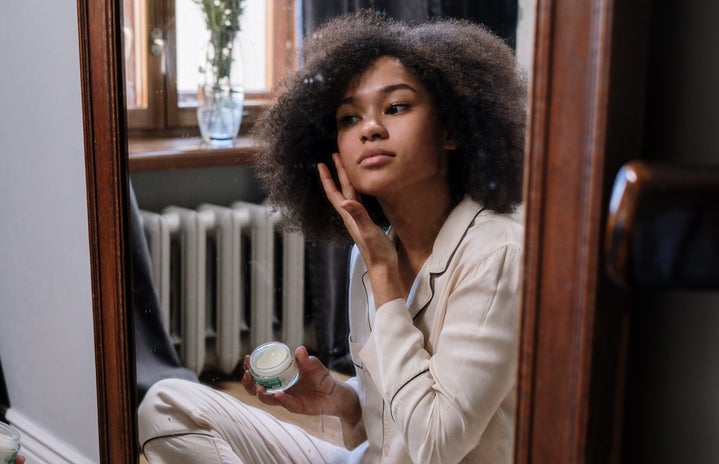Unless you’ve been living under a rock, skincare has been all the rave these days, with popular creators like @SkincarebyHyram encouraging everyone to look into cleaner beauty products. Not only is it important to look for nourishing ingredients that are good for your skin, but your power as a consumer can help the environment too. Here are a couple of changes you can make to your skincare routine, if you haven’t already, to honor our planet and your skin.

1. Exfoliating Scrubs
I remember thinking as a middle schooler that the more beads there were in an exfoliator, the cleaner my face would be. Little did I know, I was rubbing abrasive polyethylene on my skin while simultaneously hoping my pimples would vanish. I was only sensitizing my skin even more and harming the marine organisms who would ingest these beads when they washed down my sink and spread into the ocean. So, instead of looking for physical scrubs, opt for AHA products like this resurfacing serum or BHA products like this liquid salicylic acid exfoliant.
2. Synthetic Fragrance
I know, one of the best parts of doing skincare is smelling the variety of scents in a cream, mask, wash –– the list goes on. Ditch the peach-scented face cream for fragrance-free and non-irritating lotions instead. There is some debate about whether or not fragrance makes a difference in your skin, but as someone with sensitive skin, I try to steer clear of it. Not only is it harsh on your skin, but wastewater treatment plants have a hard time breaking down the ingredients that make a synthetic fragrance so they can slip into water systems through sewage discharge. This Honest Beauty cream and Versed Beauty gel cream are some of the many fragrance-free affordable options in terms of moisturizers.
3. Silicone
In a study done in Nordic countries, detectable levels of silicone were found within fish, and it was discovered that silicone can evaporate into the air. If you’re still not convinced, this article gives ten reasons why silicone is bad for your skincare regimen. The next time you’re purchasing a skincare product, try to avoid silicone or any variations of it (the list of alternative names for silicone is available in the aforementioned article).

4. Sunscreen
I grew up hating sunscreen because I thought it was sticky, oily, and worst of all, made me look like a ghost. However, you should wear sunscreen every day, even if you’re simply passing by a window. Mineral sunscreens are the way to go when it comes to saving the environment, and they’re better for your skin. The main ingredients you should look for are titanium dioxide and zinc oxide. Here’s a list of the best mineral sunscreens.
Now, this doesn’t mean you should immediately throw out your products that contain exfoliating beads, fragrance, or silicone. Part of being environmentally friendly is to use every ounce of your purchases. I’m still trying to transition out of using products that include these ingredients. When it comes time to dispose of your skincare products, I recommend looking into effective recycling methods for your used tubes. Nordstrom recently started BEAUTYCYCLE, which is part of their goal to recycle 100 tons of beauty packaging by 2025. With this program, you can take your empty products to any Nordstrom store in the U.S. and drop them off in the corresponding box! Researching about skincare products that are good for the environment may seem time-consuming, but it’s worth it for the health of your skin and the future of our earth.



